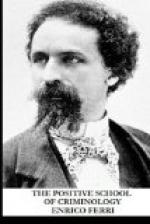But if, on the other hand, the positive school of criminology denies, on the ground of researches in scientific physiological psychology, that the human will is free and does not admit that one is a criminal because he wants to be, but declares that a man commits this or that crime only when he lives in definitely determined conditions of personality and environment which induce him necessarily to act in a certain way, then alone does the problem of the origin of criminality begin to be submitted to a preliminary analysis, and then alone does criminal law step out of the narrow and arid limits of technical jurisprudence and become a true social and human science in the highest and noblest meaning of the word. It is vain to insist with such stubbornness as that of the classic school of criminology on juristic formulas by which the distinction between illegal appropriation and theft, between fraud and other forms of crime against property, and so forth, is determined, when this method does not give to society one single word which would throw light upon the reasons that make a man a criminal and upon the efficacious remedy by which society could protect itself against criminality.
It is true that the classic school of criminology has likewise its remedy against crime—namely, punishment. But this is the only remedy of that school, and in all the legislation inspired by the theories of that school in all the countries of the civilized world there is no other remedy against crime but repression.
But Bentham has said: Every time that punishment is inflicted it proves its inefficacy, for it did not prevent the committal of that crime. Therefore, this remedy is worthless. And a deeper study of the cause of crime demonstrates that if a man does not commit a certain crime, this is due to entirely different reasons, than a fear of the penalty, very strong and fundamental reasons which are not to be found in the threats of legislators. These threats, if nevertheless carried out by police and prison keepers, run counter to those conditions. A man who intends to commit a crime, or who is carried away by a violent passion, by a psychological hurricane which drowns his moral sense, is not checked by threats of punishment, because the volcanic eruption of passion prevents him from reflecting. Or he may decide to commit a crime after due premeditation and preparation, and in that case the penalty is powerless to check him, because he hopes to escape with impunity. All criminals will tell you unanimously that the only thing which impelled them when they were deliberating a crime was the expectation that they would go scot free. If they had but the least suspicion that they might be detected and punished they would not have committed the crime. The only exception is the case in which a crime is the result of a mental explosion caused by a violent outburst of passion. And if you wish to have a very convincing illustration of the psychological inefficacy of legal threats,




